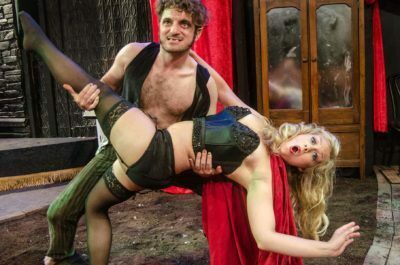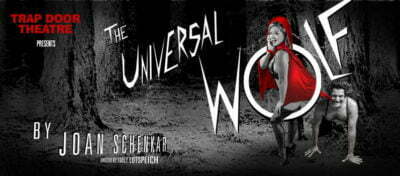The Universal Wolf
Directed by Emily Lotspeich
Produced by Trap Door Theatre
Derrida Doesn’t Always Make Things Better
Joan M. Schenkar’s The Universal Wolf was written in 1996, when Judith Butler was making French deconstructionism the rage in feminist studies. Perhaps that’s why Monseuir Wolf (Antonio Brunetti) and the narrators (Mary-Kate Arnold and Skye Fort) are so eager to assert that this play is a deconstruction and reconstruction that will leave you thinking about Little Red Riding Hood completely differently. It really isn’t, though. It’s an alternative telling of the story that restores sexually explicit themes present in original (which people have been doing since the 1920s) and presents the wolf as irritating and pretentious. As far as that goes, the Trap Door production is successful.

Most Trap Door shows begin with a few cast members silently observing the audience from onstage, and under Emily Lotspeich’s direction, the pre-show has a rich atmosphere. Rachel Sypniewski’s cabaret-style costume designs are fun and a little gritty, but the most striking visual is Nicholas Jackson’s set design, which consists of a path winding through a dirt garden with red, white, and black roses arrayed along the edges. Leslie Ruettiger, as Little Red, is a perfect match for her surroundings and remains so throughout the play; she squeals in vicious delight as she lures a cardinal to perch on her finger, and then wrings his neck so he can make a nice snack for her grandmother. Following a musical introduction by the narrators, she disappears in a flash behind a velvet red curtain booth, and the wolf appears.
He looks as much like a vampire as a werewolf, with his pointed ears, fangs, and red, black, and white painted fingernails. The wolf, who Brunetti makes tolerable through his exuberance, explains his affinity for structuralism in literary theory is due to his being French, as is his fondness for primitivism. No escaping into fantasy to avoid thinking about criminality for him, unlike German adapters of the tale, he tells us, no, his pleasure is in terrorizing and conquering eleven to fifteen year-old-girls, and he’s proud of it. In order to restore us to the original structuralism, he has us read a text in which he eats Little Red, and all will be right in the world when the story goes as it should. However, his plan is complicated by Little Red’s grandmother (Diane M. Honeyman), a retired butcher and functional alcoholic Little Red is bringing wine to, who has a violent streak and a bad temper. Add to it that Red is not as foolish as the Wolf prefers to think, and he’s got a story going somewhere he does not want it to.

The title “universal wolf” comes from a speech by Ulysses in Shakespeare’s Troilus and Cressida in which he claims the low morale in the Greek camp is due to Agamemnon’s refusal to enforce hierarchy, allowing the greed in everybody to emerge unfettered. Shakespeare’s version of the story was itself a much more cynical adaptation of a courtly romance by Geoffrey Chaucer that was tragic to begin with, which is a long way to go for the reference. That’s emblematic of the play as a whole; while it name-drops prominent literary theorists, I didn’t get the feeling there was really a great deal of substance to it (or maybe Shrek just made earlier works of this kind seem less impressive). Still, at only seventy minutes long, The Universal Wolf is an amusing fractured fairy tale. Original music by Mike Mazzocca played on the clarinet, accordion, and other cabaret-appropriate instruments keeps the characters’ meta-theatrical scheming moving along, and Trap Door is an inviting place to spend a short evening with a story that’s a little bit dirty and a little bit smart.
Recommended
Jacob Davis
[email protected]
Reviewed August 20, 2015
For more information, see The Universal Wolf’s page on Theatre in Chicago.
Playing at Trap Door Theatre, 1655 W Cortland Ave, Chicago. Tickets are $20-25; to order, call 773-384-0494 or visit trapdoortheatre.com. Playing Thursdays, Fridays, and Saturdays at 8:00 pm through September 26. Running time is seventy minutes with no intermission.

